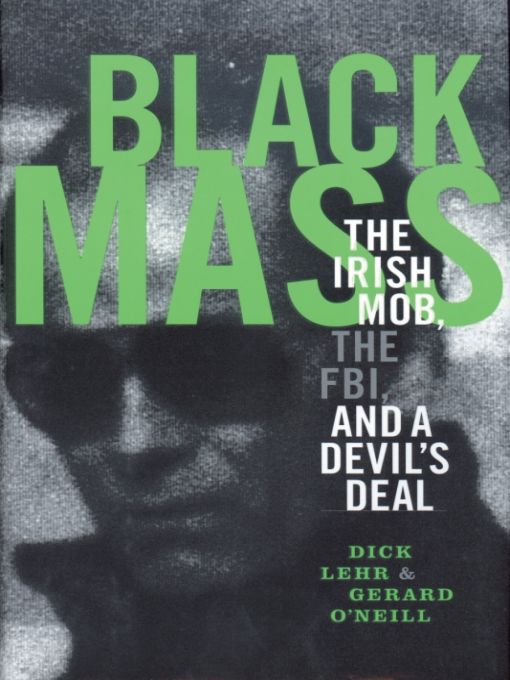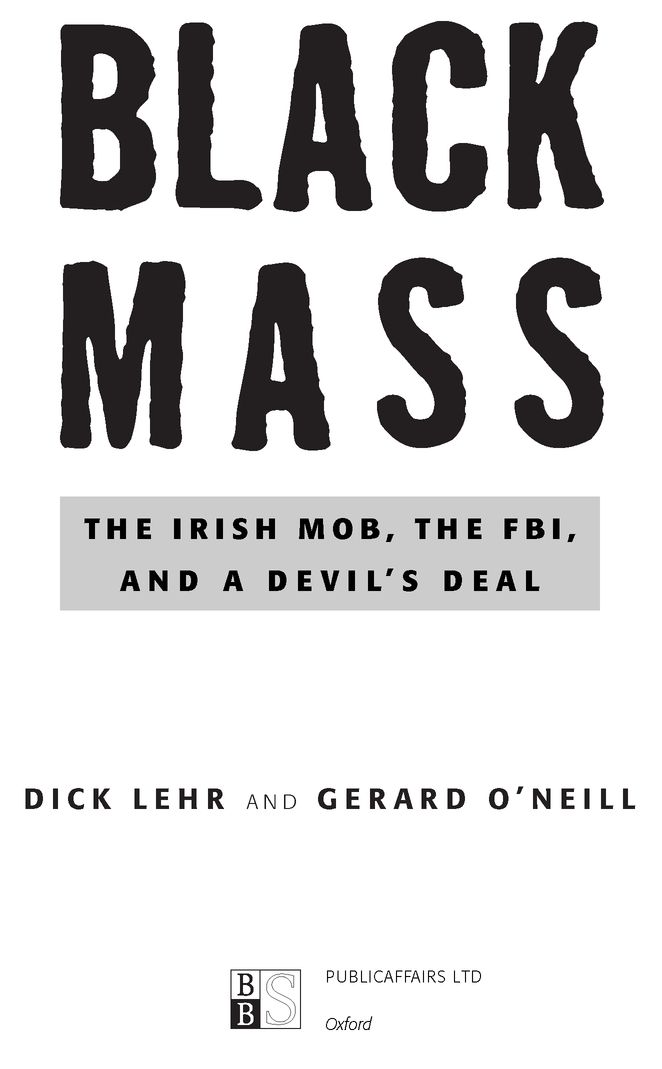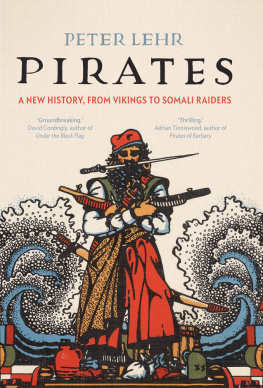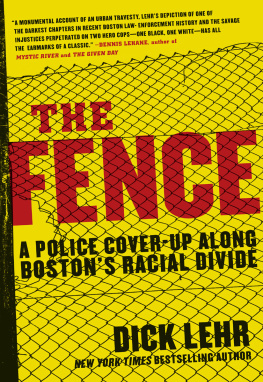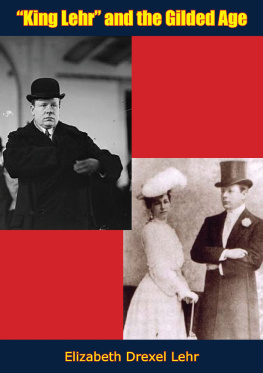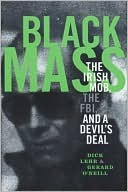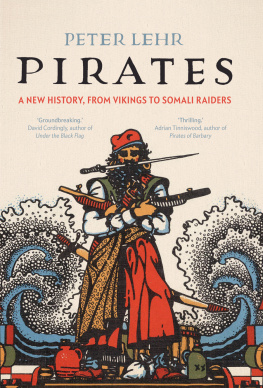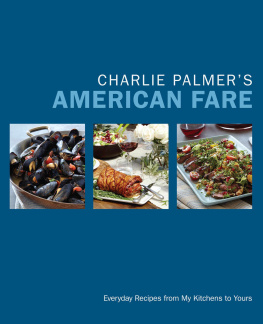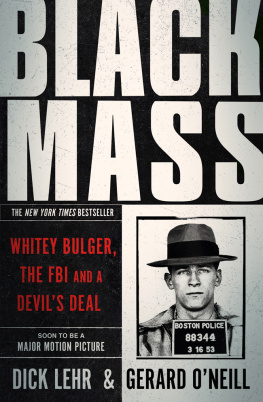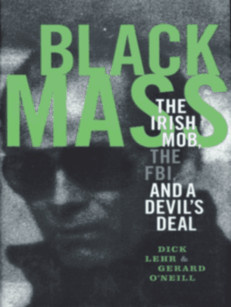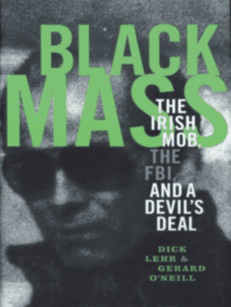Table of Contents
Praise for Black Mass
A parable of what happens when law enforcement officers get too close to their informers. It is a story that the FBI almost succeeded in suppressing. Black Mass should prompt a re-evaluation of the uses and misuses of informers by law enforcement officials throughout the country.
Alan Dershowitz, author of Reversal of Fortune: Inside the Claus Von Bulow Case, The New York Times Book Review
This is a heartbreaking and enraging story of corruption and crime, but it has its heroes, especially Dick Lehr and Gerard ONeill. These reporters were among the first to shine light on the shadowy collusion of heinous murderers and an FBI cut loose from its moral center. Now, with this powerful book, Lehr and ONeill bring the whole story into the open. Black Mass is a work of rare lucidity, high drama, journalistic integrity, and plain courage.
James Carroll, author of An American Requiem and Boston Globe columnist
More than an expos on the abuses of power, Black Mass tells of the shameful betrayal of all things decent.... Lehr and ONeill give us all the details with a journalistic precision that does not sacrifice the power of the story. After reading Black Mass, you might wonder if any of us really knows who are the good guys and who are the bad guys.
Michael Patrick MacDonald, author of All Souls: A Family Story from Southie
What a marvelous read Black Mass is.
Dominick Dunne, author of Justice: Crimes, Trials and Punishments
A jaw-dropping, true life tale of how two thugs corrupted the FBI ... a disturbing account of corruption, blind ambition, and official complicity in dark deeds.
The Baltimore Sun
You dont have to be a Mafia buff to enjoy and appreciate the story as told in Black Mass.... Black Mass is all about the nations premier law enforcement agency gone bad, with two or more of their own leading the way.... What makes Black Mass simply great is not the fantastic reporting and writing of the sordid story, but the way the two authors bring readers into the world of South Boston. The story reveals the parochial clan attitude that prevails in the neighborhood where ones word is higher measure of a man than his lifes accomplishments.... It is a great story, a great book, and a rare look at how deadly boyhood friendships in a neighborhood like Southie can be.
The Providence Journal
The book is a great readit reels you in and holds you. ONeill and Lehr have the remarkable ability to put you in the room and on the street where the action takes place. The dialogue is vital, gutsy, down and dirty.
William Bratton, author of Turnaround: How Americas Top Cop Reversed the Crime Epidemic (with Peter Knobler), The Boston Globe
[Lehr and ONeill] vividly capture the turbulent culture and conflicting loyalties of the Boston underworld.
Library Journal
Black Mass is the hair-raising true story of the cozy and corrupt relationship between the FBI, Bulger, and his sidekick Steven the Rifleman Flemmi ... an unholy alliance that shifted the balance of criminal power in Boston from the Italians to the Irish and left Bulger and Flemmi shielded from prosecution for two decades.... Lehr and ONeill assemble a breathtaking account of corruption, crime, and gross legal negligence.
The Legal Times
A triumph of investigative reporting, this full-bodied true-crime saga by two Boston Globe reporters is a cautionary tale about FBI corruption and the abuse of power.
Publishers Weekly
An eye-opening true-crimer.... The authors offer a pile of evidence that (in South Boston at least) politics is all too local.
Kirkus Reviews
Black Mass tells a story of abuse of power and betrayal by those sworn to protect the public and uphold the law. It leaves me wondering whether standard operating procedures and agent-informant relationships throughout the country should be reviewed.
The Federal Lawyer
The corruption laid out by Lehr and ONeill is pervasive and horrifying enough to make even the most inveterate cynic gag.
The Boston Phoenix
For my sons, Nick and Christian Lehr
For my even keel wife Janet and my sons, Brian and Shane ONeill
Prologue
ONE SUMMER DAY in 1948, a shy kid in short pants named John Connolly wandered into a corner drugstore with a couple of his pals. The boys were looking to check out the candy at the store on the outskirts of the Old Harbor housing project in South Boston, where they all lived.
Theres Whitey Bulger, one of the boys whispered.
The legendary Whitey Bulger: skinny, taut, and tough-looking, with the full head of lightning-blond hair that inspired cops to nickname him Whitey, even if he hated the name and preferred his real name, Jimmy. He was the phantom tough-guy teen who ran with the Shamrocks gang.
Bulger caught the boys staring and impulsively offered to set up the bar with ice cream cones all around. Two boys eagerly named their flavors. But little John Connolly hesitated, heeding his mothers instructions not to take anything from strangers. When Bulger asked him about his abstinence, the other boys giggled about his mothers rule. Bulger then took charge. Hey, kid, Im no stranger, he told Connolly. Your mother and father are from Ireland. My mother and father are from Ireland. Im no stranger.
Whitey asked again: What kind of cone you want?
In a soft voice Connolly said vanilla. Bulger gladly hoisted the boy onto the counter to receive his treat.
It was the first time John ever met Whitey. Many years later he would say the thrill of meeting Bulger by chance that day was like meeting Ted Williams.
Introduction
IN THE SPRING of 1988 we set out to write for the Boston Globe the story of two brothers, Jim Whitey Bulger and his younger brother, Billy. In a city with a history as long and rich as Bostons, brimming with historical figures of all kinds, the Bulgers were living legends. Each was at the top of his game. Whitey, fifty-eight, was the citys most powerful gangster, a reputed killer. Billy Bulger, fifty-four, was the most powerful politician in Massachusetts, the longest-serving president in the state senates 208-year history. Each possessed a reputation for cunning and ruthlessness, shared traits they exercised in their respective worlds.
It was a quintessential Boston saga, a tale of two brothers whod grown up in a housing project in the most insular of Irish neighborhoods, South BostonSouthie, as it was often known. In their early years Whitey, the unruly firstborn, was frequently in court and never in high school. There were street fights and wild car chases, all of which had a kind of Hollywood flair. During the 1940s hed driven a car onto the street-car tracks and raced through the old Broadway station as shocked passengers stared from the crowded platform. With a scally cap on his head and a blonde seated next to him, he waved and honked to the crowd. Then he was gone. His brother Billy set off in the opposite direction. He studiedhistory, the classics, and, lastly, the law. He entered politics.

